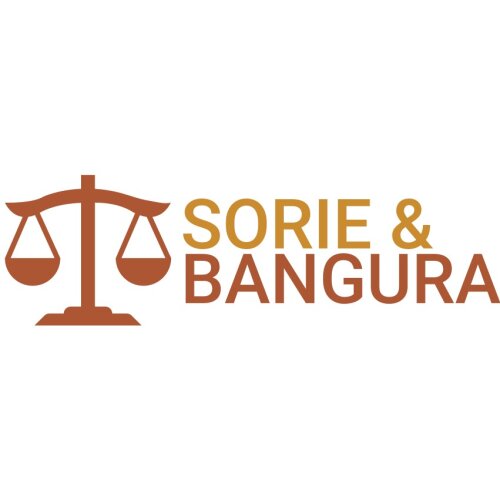Best Public-Private Partnerships (PPP) Lawyers in Freetown
Share your needs with us, get contacted by law firms.
Free. Takes 2 min.
List of the best lawyers in Freetown, Sierra Leone
About Public-Private Partnerships (PPP) Law in Freetown, Sierra Leone
Public-Private Partnerships (PPPs) in Freetown, Sierra Leone, are legally binding arrangements between public sector entities and private sector companies. These collaborations focus on designing, financing, constructing, and managing public projects or services, such as infrastructure, transportation, energy, health, and education. The objective is to combine the efficiency and innovation of the private sector with the oversight and public interest mandate of the government. PPPs have become increasingly important in Sierra Leone due to the need for improved infrastructure and services, especially in major urban centers like Freetown.
Why You May Need a Lawyer
Navigating PPPs can be complex due to their legal, financial, and operational implications. You may need the assistance of a lawyer in the following situations:
- Negotiating the terms and conditions of a PPP agreement with a government agency or private company
- Understanding compliance requirements under local PPP regulations
- Assessing and allocating risks between parties
- Resolving disputes during any stage of the PPP lifecycle
- Securing permits, licenses, or financial arrangements for a PPP project
- Advising on land acquisition, environmental impact, or labor issues associated with PPPs
- Handling amendments, extensions, or early terminations of PPP contracts
A qualified legal professional can help you understand your rights, fulfill your obligations, and ensure the long-term success of your PPP project.
Local Laws Overview
Sierra Leone has specific legislation and policies governing Public-Private Partnerships. The Public-Private Partnership Act, 2010, and its supporting frameworks guide the formation, regulation, and oversight of PPPs in Freetown and the broader Sierra Leonean context. Key aspects relevant to local PPP law include:
- The Act establishes the Public-Private Partnership Unit (PPPU) as the central authority overseeing PPP projects
- All PPPs must comply with transparency, fairness, and value for money principles
- Public procurement rules are enforced to ensure competitive bidding and prevent corruption
- Clear guidelines exist for project initiation, feasibility studies, public consultation, and stakeholder engagement
- Risk allocation and dispute resolution mechanisms are mandated in every PPP contract
- Projects with significant environmental or social impacts must comply with environmental assessment protocols
- Any foreign or local investor must adhere to investment and land use regulations
Understanding these legal requirements is essential before entering into or managing a PPP in Freetown.
Frequently Asked Questions
What is a Public-Private Partnership (PPP)?
A PPP is a long-term contract between a government agency and a private sector entity to deliver a public service or infrastructure project, sharing risks and rewards.
Who oversees PPPs in Freetown, Sierra Leone?
The Public-Private Partnership Unit (PPPU), under the Ministry of Finance, is responsible for the oversight and regulation of all PPP projects in Sierra Leone.
Are foreign investors allowed to participate in PPPs?
Yes, both local and foreign investors can participate in PPPs, provided they meet all legal and regulatory requirements.
What sectors are covered by PPPs in Sierra Leone?
PPPs commonly cover sectors like roads, energy, water, waste management, healthcare, and education, among others.
How are PPP contracts awarded?
PPP contracts are usually awarded through a competitive bidding process, although direct negotiations may occur in some cases, subject to strict legal criteria.
What main risks are involved in PPP projects?
Risks may include construction delays, financial shortfalls, changes in law, environmental concerns, and disagreements between partners. These must be clearly defined and managed in the contract.
How long do PPP contracts typically last?
PPPs are designed as long-term arrangements, often lasting between 10 to 30 years, depending on the project type and investment requirements.
What happens if there is a dispute in a PPP?
Most PPP contracts include dispute resolution mechanisms such as negotiation, mediation, arbitration, or recourse to the courts, depending on the terms of the agreement.
Can a PPP agreement be amended or terminated?
Yes, PPP agreements can be amended or terminated under certain conditions outlined in the contract, but such actions require careful legal consideration to avoid breaches and penalties.
What documents are required to initiate a PPP project?
Typical documents include a detailed project proposal, feasibility study, business case, environmental impact assessment, and proof of compliance with local laws and procurement rules.
Additional Resources
If you are seeking more information or legal support regarding PPPs in Freetown, Sierra Leone, consider reaching out to the following:
- Public-Private Partnership Unit (PPPU), Ministry of Finance
- Ministry of Justice, Sierra Leone
- Sierra Leone Investment and Export Promotion Agency (SLIEPA)
- Sierra Leone Bar Association
- Development partners such as the World Bank and African Development Bank, which support PPP initiatives
- Local legal firms with expertise in PPP and infrastructure law
Next Steps
If you need legal assistance or advice regarding Public-Private Partnerships in Freetown, it is important to act promptly. Start by gathering all relevant project documentation and clarifying the main issues you wish to address. Contact a lawyer or law firm experienced in PPP law to discuss your needs, verify their credentials, and understand their experience in handling similar matters. You may also consult with the PPPU or other support organizations to get general guidance before proceeding. Being proactive and informed increases your chances of successful project execution and protects your interests under Sierra Leonean law.
Lawzana helps you find the best lawyers and law firms in Freetown through a curated and pre-screened list of qualified legal professionals. Our platform offers rankings and detailed profiles of attorneys and law firms, allowing you to compare based on practice areas, including Public-Private Partnerships (PPP), experience, and client feedback.
Each profile includes a description of the firm's areas of practice, client reviews, team members and partners, year of establishment, spoken languages, office locations, contact information, social media presence, and any published articles or resources. Most firms on our platform speak English and are experienced in both local and international legal matters.
Get a quote from top-rated law firms in Freetown, Sierra Leone — quickly, securely, and without unnecessary hassle.
Disclaimer:
The information provided on this page is for general informational purposes only and does not constitute legal advice. While we strive to ensure the accuracy and relevance of the content, legal information may change over time, and interpretations of the law can vary. You should always consult with a qualified legal professional for advice specific to your situation.
We disclaim all liability for actions taken or not taken based on the content of this page. If you believe any information is incorrect or outdated, please contact us, and we will review and update it where appropriate.












